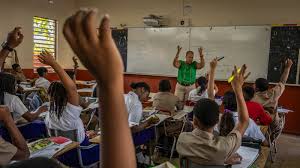Teachers play a crucial role in shaping the lives of students and preparing them for the future. As educators, they are responsible for not only imparting knowledge but also instilling values, morals, and respect in their students. The relationship between teachers and students is a delicate one, built on trust, understanding, and mutual respect. However, the question of whether teachers have the right to treat students without respect is a complex and contentious issue that has sparked debate and controversy in the education field.
Historically, the role of teachers has been revered and respected in many societies. In ancient civilizations such as Greece and Rome, teachers were held in high esteem and considered as important figures in the development of young minds. They were seen as mentors, guides, and role models who had a profound impact on the intellectual and moral growth of their students. The idea of respect for teachers was deeply ingrained in these societies, and any disrespect towards a teacher was considered a serious offense.
In more recent history, the relationship between teachers and students has evolved, with a greater emphasis on equality, respect, and mutual understanding. The concept of student-centered learning has gained prominence, highlighting the importance of students’ voices, ideas, and contributions in the educational process. This shift has led to a reevaluation of the traditional power dynamic between teachers and students, with an increasing emphasis on treating students with respect and dignity.
Despite these advances, there are still instances where teachers may feel justified in treating students without respect. Some teachers may argue that certain students exhibit disruptive or disrespectful behavior that warrants a tougher approach. They may believe that by asserting their authority and maintaining discipline, they are fulfilling their duty as educators and instilling a sense of order in the classroom. In some cases, teachers may resort to harsh or punitive measures in an attempt to control unruly behavior, leading to conflicts and tensions between teachers and students.
On the other hand, there are those who believe that teachers do not have the right to treat students without respect under any circumstances. They argue that every student deserves to be treated with dignity and kindness, regardless of their behavior or academic performance. Respect is seen as a fundamental human right that should be upheld in all interactions, especially in the teacher-student relationship. By modeling respectful behavior, teachers can create a positive and nurturing learning environment that promotes trust, collaboration, and understanding.
One influential figure in the field of education who has advocated for treating students with respect is Maria Montessori. Montessori was an Italian educator and physician who developed the Montessori method, a child-centered approach to education that emphasizes independence, freedom, and respect for the individual. Montessori believed that children are inherently curious, self-directed learners who thrive in an environment that promotes exploration, creativity, and collaboration. Central to her philosophy is the idea that teachers should treat students with respect and trust their innate abilities to learn and grow.
Another key figure in the discussion of respect in education is Paulo Freire, a Brazilian educator and philosopher known for his work on critical pedagogy. Freire’s seminal work, “Pedagogy of the Oppressed,” argues that education should empower students to question and challenge oppressive systems of power and domination. He believed that teachers should engage students as critical thinkers and collaborators in the learning process, rather than as passive recipients of knowledge. Freire’s emphasis on dialogue, empathy, and respect for students’ voices has had a profound impact on the field of education, inspiring educators to reconsider their role in fostering a culture of respect and equality in the classroom.
In conclusion, the question of whether teachers have the right to treat students without respect is a complex and multifaceted issue that hinges on the values, beliefs, and practices of educators. While there may be instances where teachers feel justified in taking a firm stance against disruptive behavior, it is essential to remember that respect is a fundamental human right that should be extended to all individuals, regardless of their age or status. By fostering a culture of respect, empathy, and understanding in the classroom, teachers can create a safe and supportive environment where students can thrive and reach their full potential. It is essential for educators to reflect on their practices, engage in meaningful dialogue with students, and work towards building positive and respectful relationships that honor the dignity and worth of every individual. The future of education lies in creating inclusive, equitable, and respectful learning environments that empower students to become active, engaged, and compassionate members of society.



